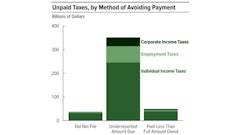
The last time a single party controlled the White House and Congress, the two branches of government concerned themselves completely with a failed attempt to take health care away from Americans and a successful bid to slash taxes.
If the Tax Cuts and Jobs Act of 2017 had delivered the debt-nullifying economic growth that its authors promised (in direct contradiction to the calculations of the Congressional Budget Office and all other nonpartisan watchdogs who ran the numbers), that would have been OK. As the legislation's long-shot economics have actually played out, you'd have be be very persuaded by its authors' government-doesn’t-work approach to be willing to stand by while they wreck the country's finances instead of trying to address its needs.
By 2019, the Tax Cuts and Jobs Act of 2017 had added $2.3 trillion to the national debt. And the bipartisan Committee for a Responsible Federal Budget estimates additional actions by the White House – roundly supported by the Senate – added another $1.6 trillion to federal debt.
After the 2020 election, though, a significant contingent of the closely divided Senate filled discussion of rescuing America's crumbling infrastructure with talk about budget restraint. They’re lead by Kentucky Senator Mitch McConnell – who reaffirmed this spring his prioritizing partisan power struggle over serving the American people that he first declared after the 2008 election, by saying, “One hundred percent of my focus is standing up to this (Biden) administration.”
The CBO just released its score on the $1.2 trillion infrastructure bill, on which senators hammered out details early this week. McConnell’s caucus waited patiently on this CBO report, ostensibly to inform their support for the bill. Contrary to promises that the bill would be fully paid for, and perhaps to avoid being scalded by their own blatant hypocrisy, they maintain support for the bill even though the CBO found that it would add more than $250 billion to the federal deficit over the next decade.
“Budget restraint” sounds prudent. We like people who handle our money with care.
It’s worth noting there were opportunities to make up the $25 billion-per-year shortfall in funding for the infrastructure bill. Last year, for example, the IRS estimated it failed to collect an average of $441 billion in tax revenue per year because taxpayers did not comply with tax law. The shortfall could actually be as much as $1 trillion annually, according to Donald Trump’s appointee to IRS commissioner, Charles Rettig.
McConnell’s caucus issued a hard “no” when the initial draft of the bill included paying for infrastructure by making tax evaders pay what they owe. This was after demonstrating similar inflexibility against rolling back a little of the abundance of the Tax Cuts and Jobs Act, increasing the gas tax and raising user fees.
The senators went along with going after fraud in the unemployment insurance program, which could raise $35 billion over the coming decade. The senators don't trust the government they haven't fixed with the funds necessary to provide the infrastructure that will allow the people they serve to prosper.
These public servants ran up a $3.9 trillion pre-pandemic debt with policy that accomplished, more than anything, shifting tax burden off big campaign contributors. They devoted their energy on achieving this to the exclusion of taking up legislation to rescue our foundering infrastructure in the face of:
- The clear majority of Americans who will pay more for better infrastructure
- The economic growth that safe and efficient infrastructure can bring
- The urgent needs to repair all of U.S. infrastructure
And now they're hobbling efforts to meaningfully address the urgent need that would improve our economic performance, which is what Americans want. Haggling over funding 10 to 100 times smaller than the actual need as if the floor of the Senate was a fish market.
Politicians are going to mouth more budget-conscious sounding words in the weeks and months ahead. It’s important to note who makes these noises, and how their record demonstrates what they’re really trying to accomplish.






























